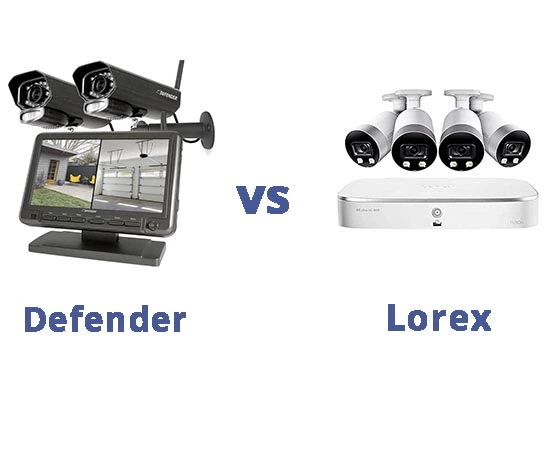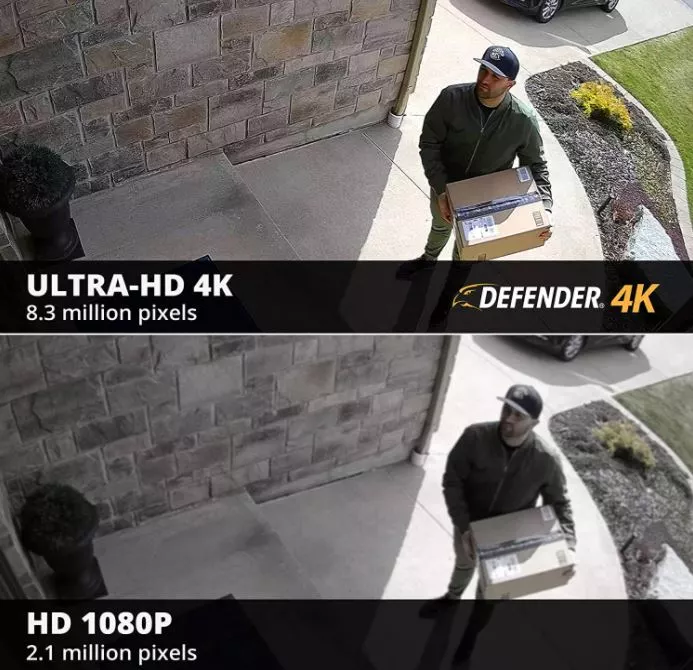As an Amazon Associate, I can earn from qualifying purchases. Learn more.
Are you looking for a simple, yet reliable security camera kit with its own monitor? What about an expandable system to cover a large property? If YES, this review compares Defender vs Lorex, both of which have two kinds of systems.
Apart from that, the security companies also share a backyard- Canada. But again, Lorex has been under four different managements, with Dahua as the latest owner.
Anyhow, either Defender or Lorex may be what you want right now to monitor your home or business. So, let’s break them down together and see what will be more advantageous to get.
Defender vs Lorex: An Overview on the Two Security Camera Systems
Is Defender A Good Security Camera?
- PLUG & PLAY: Set up your wireless outdoor security cameras in 3 minutes and enjoy...
- NO WI-FI REQUIRED: With our 7-inch LCD screen, you can view up to 4 cameras at one time in full,...
In truth, Defender is a great security camera. It’s one of the bestselling names in major outlets across the country, including Amazon, Walmart, Lowe’s, Home Depot, and others. Reason?
Well, as a brand, Defender has been in the market for more than two decades, thereby there’s the aspect of craftsmanship. In fact, the company has remained consistent on quality, with most of the cameras (that we’ve gone through so far) featuring a rugged metallic construction.
Even better, Defender offers most of their wired and wireless security camera systems with a standard two-year warranty. And according to the various users who have had issues with their devices, the company seems to honor its warranty policy.
Is Lorex A Good Security Camera?
- Wireless Security Camera System - This home center comes with a touch screen hub and voice assistant...
- 1080p Bullet Cameras - The HD security cameras have a 129-degree field of view ideal for monitoring...
Similarly, Lorex can be an exceptional surveillance and security system for your home and business. It not only has a wide catalog to choose from but also incorporates some of the best CCTV features.
In the previous Lorex vs Nest review, we actually saw the Canadian leads the American brand on things like video quality, compression technology, and storage allocation. But again, the Nest Cam still ended up being more reliable and, of course, easier to Trust from its American and Google ties.
Anyway, back to Lorex, the brand has been pretty consistent in innovation while incorporating the latest technologies. For instance, you can get up to 4K color night vision security cameras with advanced AI, including face/ person/ vehicle detection.
Defender vs Lorex: Comparing the Key Features and Functions of the Security camera
Pricing
Overall, the Defender security camera systems are considerably cheaper than Lorex. If it’s the wireless catalog, the famous Non-WiFi Phoenix unit starts at a price tag of $200 to $300. However, you can also get a standalone 2K WiFi outdoor camera at a regular price of a hundred bucks.
The Defender expandable security camera systems are also reasonably-priced as you can get a 4K Ultra-HD kit from a regular tag of $280 to around $800. However, the brand only deals with modern-but-analog DVR systems, for now.
On its end, Lorex is more driven to deliver a professional-grade system, whereby it has both analog and PoE security cameras. The system has from as low as 4 channels up to 32 channels. So, you can expect the price to be higher (up to $3,000), especially with the famous Nocturnal IP NVR system.

However, Lorex wireless catalog is relatively budget-friendly, though not like the Defender. If it’s the Lorex Smart Home Wireless Camera Kit, you can grab it at a regular tag of about three hundred bucks. However, you can get a standalone WiFi camera, but the price is still higher than that of Defender.
Regardless, both Defender and Lorex currently have limited-time offers on their various wired and wireless systems. Some of the best deals you can check out include:
Defender Non-WiFi Phoenix Wireless Security System
Features a 7-inch TFT display, VGA 480 video quality, Two-way talk support, Non-WiFi wireless technology, and 128GB local SD storage
Defender 4K Ultra-HD Security DVR System
Features a 4-channel recorder, 8MP bullet cameras, 4K@15fps videos, infrared night vision, analog BNC wiring, and preinstalled 1TB hard drive.
Lorex 4K UHD Deterrence Security NVR Kit
Features an 8-channel recorder, 8MP bullet cameras, 4K@15fps videos, color night vision, built-in siren, face/ person/ vehicle detection, and 3TB hard drive.
Lorex Full HD WiFi Smart Home Security Camera System
Features a 7-inch control display, multiple smart deterrence features, two-way talk function, face detection, humanoid detection, and 256GB MicroSD support
Video Quality
When we now compare defender 4k vs lorex 4k on the video quality, the pair record up to 4K Ultra-HD resolution. However, we’ll give the whole point to Lorex as it delivers clearer images both day and night. The reason for that starts with the fact that the brand is using PoE technology,which usually sends video signals that they’ve already processed.
Secondly, Lorex 4K cameras have a built-in HDR feature that helps deliver exceptional images in unbalanced lighting conditions. Then, thirdly, there’s an integrated spotlight to record in color at night.
Comparably, the Defender 4K camera also do deliver videos with brilliant details at night. However, its proprietary ClearVu image technology only focuses on improving the existing infrared recording but not color.
As for the Defender Non-WiFi security system, the included cameras record in VGA quality (640 x 480p). But since the device comes with its own tablet-like monitor, you’ll notice the images are still clear enough to distinguish your dog from a coyote.

Video Frame Rate and Compression
If we’re to stick with our two reference machines, both Defender and Lorex take the point on the video compression. In either, you can set to record in HEVC H.265 format, thereby cutting down the storage consumption by more than a half.
Moreover, the Defender and Lorex 4K security cameras can record at 15fps, which is pretty decent in the smoothness.
Nonetheless, Lorex does have a 4K 30fps security camera, which can record more frames of the moving object. Thus, giving you exceptionally smooth videos with most (if not all) moments of the object.
Audio Functions
Lorex is the clear winner here as it has most of its cameras with audio functionality. In fact, our reference WiFi and PoE cameras do have a built-in microphone and speaker. So, you’ll not only have videos that you can hear whoever’s facing the camera, but also talk back as with a walkie.
Moreover, the Lorex cameras have a built-in siren feature that you can activate through the phone remotely or the recorder’s panic button. Thus, warding off the potential intruder before breaking into your property.
Meanwhile, the Defender 4K cameras don’t have built-in audio features. In other words, that means you’ll have to add an external microphone and or speaker through the DVR.
Nonetheless, the Defender Non-WiFi wireless camera has a built-in microphone and speaker. But then, the system doesn’t support remote viewing via a mobile phone. Thus, you’ll have to use its display to communicate through the two-way talk feature.
Intelligent Analytics
Lorex is yet the winner here as it has more intelligent features than we can see in the Defender security cameras. Of course, many of these capabilities has come with Dahua’s involvement, but who cares.
The cameras can now be set to push alerts and or record when they only detect a face, humanoid shape, or car. Thus, cutting down the false alerts by an even more magnitude than when they only had the smart PIR motion detection.
It’s also worth mentioning that Lorex cameras can also send alerts and start recording after detecting sound. You just need to enable the feature from your Lorex home app and set the sound sensitivity level.
Unfortunately, neither of the Defender security cameras support sound detection or any advanced AI, for now. However, you can set the sensitivity of the motion detection to the lowest level. Thus, detecting movements from only sizable objects while ignoring others like wind, leaves, and insects.
Free Storage
In this one, both Defender and Lorex are winners since they support local recording to a MicroSD card and Hard dive disc. So, you won’t need to pay any monthly fees, yet you’ll always have evidence whenever you need it.
It’s also important to mention that you can playback the SD card recordings of either of the camera brands from the mobile app. So, you necessarily don’t need to bother removing the card and then insert it on your phone or computer to view.
Smart Home Integration
Last but not least, you can pair your Lorex security cameras to automation devices with Amazon Alexa or Google Assistant. That includes the TV Firestick, Chrome cast, Echo Dot, or Echo Show display. Thus, helping you create your own smart home ecosystem that you can not only access and manage from one hub. But also enable hands-free control using simple voice commands, which, of course, is fun.
Conclusion:
Well, both Defender and Lorex are great security camera systems. They have most of the things you’d want when you want to keep an eye on your property, including exceptional video quality, free storage, and remote viewing with the mobile app.
Even so, investing in a Lorex security camera would give you the advantage of some crucial features lacking in a Defender system. Some of these features include the ability to record in 4K at 30fps, which is great for areas with high traffic.
Also, the Lorex camera has the option to record in full color at night, as well as advanced AI features and hands-free control with Alexa/ Google Assistant.